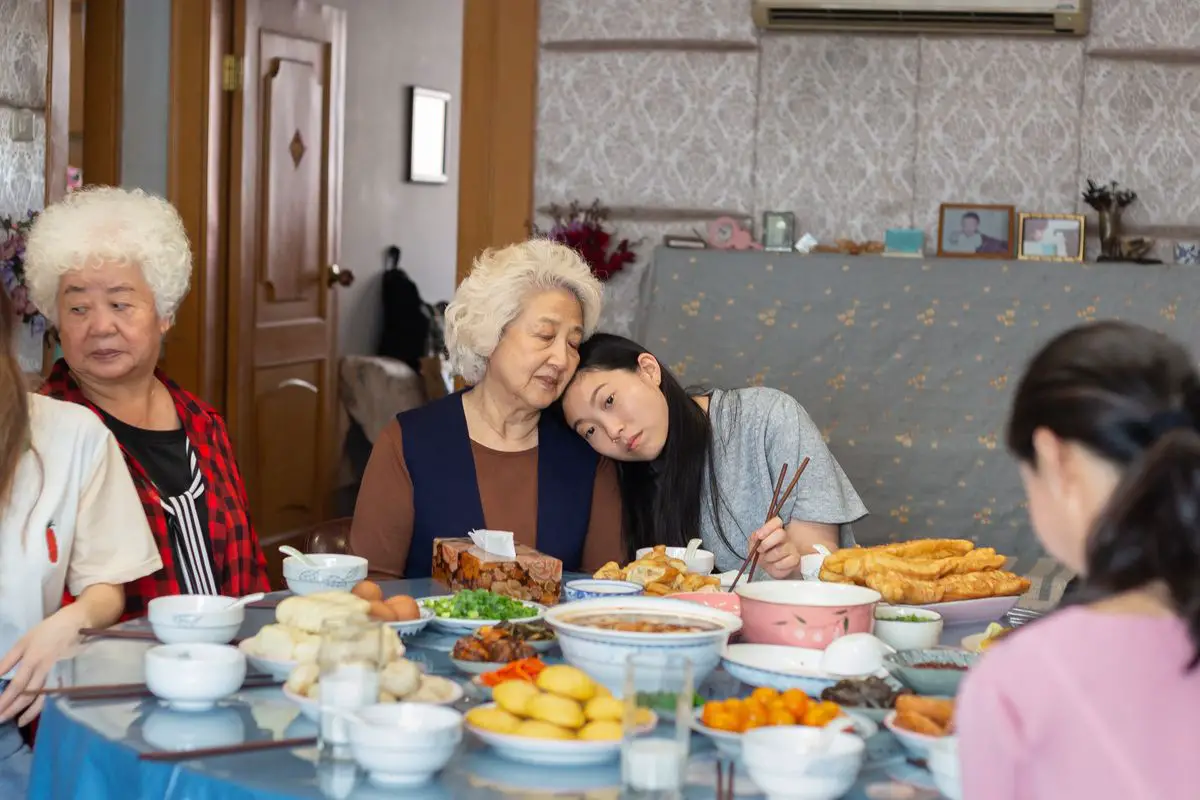Midway through Lulu Wang’s semi-autobiographical film, “The Farewell,” Billi (Awkwafina) races to the hospital in the pouring rain. She is in a hurry, stomping furiously alongside her father (Tzi Ma).
Both family members are on their way to receive imperative news about their family matriarch. There is a spellbinding, side-view shot of a highway in urban China. Cars race by and splash the curb.
In what could simply be a poignant shot signifying family dedication, Billi and her father take the wrong turn on a side path. They fumble as they return to the main street. To worsen matters, Billi’s umbrella suddenly inverts under the wind’s pressure. Water splashes all over her, and she curses loudly.
When I first watched this scene in “The Farewell” — in a packed cinema on a Tuesday night — the audience erupted into laughter. I could hear popcorn tumble onto the carpeted floor.
The umbrella scene is one of many scenes in “The Farewell” that balances slow, simmering sadness with unexpected bursts of comedy. The film tackles heavy themes such as loss and cultural alienation, while also using humor to make these themes feel palatable.
“The Farewell” follows Billi, a Chinese American writer living in New York, who learns about her grandmother’s (Shuzhen Zhao) recent diagnosis with lung cancer.
In China, there is a cultural belief that once a person knows about their cancer diagnosis, the fear of having the disease can accelerate the prognosis. As such, Billi’s parents decide to keep the disease a secret from her grandmother.
Instead, the family uses a staged wedding as a setup to visit the grandmother in China. What ensues is a prolonged meditation on familial responsibility and shared grief. Wang highlights these themes with cinematic shots of Changchun, from rows of orange brutalist apartments to a gorgeous landscape shot of a neighborhood bridge.
Filmmakers produced “The Farewell” in the same neighborhood of Changchun where Wang was raised. This choice gives each shot an element of real-life sincerity. Wang filmed the wedding scene in the same building as the real-life event, and a scene where the family visits the grandfather’s cemetery was produced at Wang’s own grandfather’s gravesite. Wang’s great-aunt even plays herself in the film.
The entire film basks in a sense of grief and longing, but this sadness is coated by a heartfelt, positive outer layer. Beyond the umbrella scene, key examples of these mixed tones include the wedding scene, in which the entirety of Billi’s family plays a drinking game that leaves the groom green-faced.
Also effective is a scene midway through the film, where the family visits the grandfather’s gravesite. Mourning rituals are accompanied with a debate about the appropriateness of leaving cigarettes on the grandfather’s grave. “He’s already dead!” muses one family member.
Of course, “The Farewell” isn’t the only film to marry heavy themes of grief with comedic elements. In recent memory alone, Oscar-magnets “Manchester by the Sea” and “Three Billboards Outside Ebbing, Missouri” also fuse conflicting emotions with similar success.
Perhaps it is Wang’s dedication to keeping the tone of the film consistent — always warm and funny, with the sadness remaining a muted undercurrent, save for a few tense scenes — that made my viewing of “The Farewell” so lively.
The performances are mostly strong. Shuzhen Zhao as the family matriarch is the definite highlight. She brings joie de vivre into every scene with her character, whether she is creating meat pies or performing Tai Chi outside the apartment.
Awkwafina is present as the introverted, culture-shocked Billi, but this really isn’t her movie. Billi comes across more as a lens through which to view the foreign world of Changchun than as a well-rounded individual.
And while Billi and Nai Nai were fleshed out as characters, Wang rarely explores the rest of the family with much detail. The film contained little to no insight into the various aunts, uncles, or even the couple around which the China trip was superficially organized.
It is possible that Wang doesn’t examine the individual family members deeply because we are supposed to see Billi’s family as one body. While every family member has varying thoughts about keeping Nai Nai’s cancer a secret, the family sets aside personal differences to work on keeping her blissfully ignorant.
Of course, it wasn’t merely strong performances and moments of humor that made my viewing of “The Farewell” so enjoyable.
This film outperformed “Avengers: Endgame” in the box office in terms of per-theater average on release, even though it only opened in four theaters on its opening date.
What other aspect of this film could honestly inspire critics to give the film a whopping 100% on Rotten Tomatoes (as of July 30, 2019), and what filled my Tuesday night cinema audience with such glee?
I am not Asian, so I cannot comment on how accurately this film captures Chinese family dynamics. Thus, before I delve into the cultural aspects of the film, I want to first share some perspectives from Asian American writers that I have encountered when researching for this review.
In a review in the magazine The Nation, author Kristen Yonsoo Kim muses how dialogue in “The Farewell” mirrored her own family’s experiences. Similarly, in The Globe and Mail, the interviewer shares an anecdote about the director being stopped by a barista at a coffee shop whose family story mirrored Wang’s own.
One need only scan this BuzzFeed listicle to understand how strongly Chinese Americans resonated with Wang’s story of familial duty.
Still, being outside the culture represented in this film affords me an interesting, albeit less firsthand perspective. When watching “The Farewell,” I was surprised at how often I saw the same family dynamics appear in Billi’s family as I have sometimes noticed in my own.
The friend with whom I saw the film agreed with me, and she even recognized some lines of dialogues as phrases her grandmother had once spoken to her over phone calls.
With all the dim sum and Tai Chi rituals considered, “The Farewell” succeeds equal parts because it represents Chinese culture and because its message contains an element of universal relatability.
Many can see aspects of their own families projected onscreen via Billi’s clan, and many cultures can resonate with the theme of carrying a burden on behalf of one’s family members.
In an interview for the CBC culture podcast “Q,” Wang discussed the need to regularize Asian American stories in Hollywood film.
“We have to stop sub-dividing Americans and American communities and American people,” she comments. “We are all hyphenates…[we all] bring our own cultures into American culture.”
Wang’s cinematic trip to Changchun is truly American, no hyphen needed. Both the director’s adroit use of conflicting tones and her keen cultural sensitivity make “The Farewell” a worthwhile summer watch.
This is one movie that deserves to be experienced while it is still in theaters. Bring some tissues, some popcorn and as many family members as you can.
“The Farewell” is playing in select theaters across Canada and the United States.
















